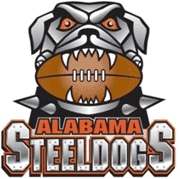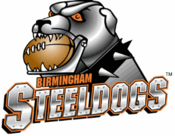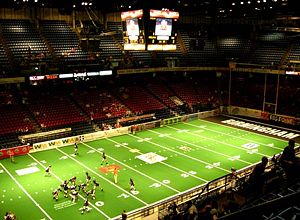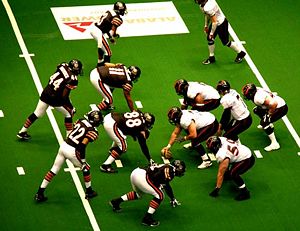Alabama Steeldogs
| Alabama Steeldogs | |

| |
| Sport | Football |
|---|---|
| League | af2 |
| Active | 2000–2007 |
| Home field | BJCC Arena |
| Record | 63-66-0 |
| Coaches | Bobby Humphrey (2000–2005) Ron Selesky(2005–2007) |
| General manager | N/A |
| Website | steeldogs.com (Defunct) |
The Alabama Steeldogs, originally named the Birmingham Steeldogs, were incorporated in 2000 as one of the charter teams in the "af2", the developmental league of the Arena Football League. The team's owners suspended play for the 2008 season. The Steeldogs eight seasons made them the longest-lived of numerous professional football franchises in Birmingham's history.
The team's original head coach was former University of Alabama standout Bobby Humphrey – the af2's all-time winningest coach. However, after finishing the 2005 season with only two victories, Humphrey resigned. On October 4, 2005, Ron Selesky was hired as the team's second coach. He resigned shortly before the suspension of operations was announced in October 2007.
The team played its home games at the BJCC Arena downtown. The arena was the site of the very first af2 game in 2000, between the Steeldogs and the Tennessee Valley Vipers, based in Huntsville.
The team's colors were black, orange, and white. The team's name – unique in all of sports – paid tribute to Birmingham's steel industry.
The team's logo, depicting a bulldog with a spiked collar and metal lower jaw, represented "Rusty", the team's mascot. The team's cheerleaders were known as the "Showsteelers."
The team's majority owner, Buddy King, changed the name of the team from "Birmngham Steeldogs" to "Alabama Steeldogs" on December 12, 2006 "to better embody the fan base of its home state", though the teams colors and the venue for home games did not change.
Team History
On April 20, 1999, Birmingham’s indoor football odyssey took flight during a press conference announcing the formation of the Xtreme Football League, which would be comprised of 10 to 12 teams along the East Coast, including Birmingham, playing a new brand of indoor ball without the patented nets of the Arena Football System.
By July 1999, a list of potential nicknames for the Birmingham franchise had been narrowed down to six possibilities: “Barbarians,” “Blast,” “Bruisers,” “Bubbas,” “Magicians” and “Steeldogs.”
Meanwhile, the Xtreme Football League brokered a deal with the more-established Arena Football League to form the latter’s second-tier. Christened “arenafootball2” or “af2” for short, the new league would play by the same rules patented by its parent organization. All of a sudden, Birmingham was no longer chartering unknown waters in the indoor game. Instead, the city was to be the launch pad for a new venture in a well-established enterprise.
At a press conference on August 12, 1999, the team’s name, logo, colors and head coach were all introduced. Bobby Humphrey, the University of Alabama’s second all-time leading rusher, would be the team’s first coach. Humphrey, a Birmingham native, had this to say upon his hiring.
This is a big opportunity for me. What better place to be than right here among the people who watched you play in high school, in college and in the pros? It was an opportunity I just couldn't pass up. Ten, fifteen years ago, I could have never seen myself doing this. But I've got a burning desire to coach. I'm going to make the best of this opportunity, unlike some of those that I have blown in the past.
The first Steeldogs ownership group, consisting of Charles Felix, David Berkman and Bruce Burge, also owned the Birmingham Bulls hockey franchise, which also used the BJCC arena.
First season
On January 11, 2000, the Commissioner of the af2, Mary Ellen Garling announced the league would kick off its inaugural season in Birmingham on March 31, 2000. The Steeldogs first opponent would be the Tennessee Valley Vipers, Birmingham’s neighbor 100 miles to the north in Huntsville. By design, these two teams would establish one of the leagues most intense rivalries.
Slowly, Birmingham’s roster took shape, as did a front office staff and a game operations staff. Ten of the team’s first 12 players were from the Birmingham area.
Birmingham welcomed 14,831 fans and a national television audience into the BJCC Arena on March 31, 2000 for the first game in af2 history. The game was a tremendous hit. Fans were kept on the edge of their seats all night as footballs and football players flew all over the shortened field, some times spilling up and into the seats. The scoreboard, as is typical in Arena ball, got quite a workout. Unfortunately, however, it was the Vipers doing most of the scoring. Tennessee Valley took the first game in the series, 59-18.
Birmingham’s first win came one week later at the BJCC, as the Steeldogs shut down the Greensboro Prowlers 18-7 in one of the lowest scoring games in the history of Arena Football. But fans still showed up in droves and it seemed that the off-the-wall sport of Arena Football was finding its niche in the self-proclaimed “Football Capital of the South.”
Birmingham would taste victory six more times in 2000, finishing the year with a 7-9 final record. In addition to the win over the Prowlers, Birmingham racked up victories over Roanoke (twice), Richmond, Tallahassee, Arkansas and Tulsa. The Steeldogs’ win over Tallahassee, an 86-74 barnburner, still ranks as the fourth-highest scoring game in af2 history.
By the end of the first season, 71,402 fans had crossed the turnstiles at the BJCC to see Birmingham’s “Hometown Team.” A secure foundation had been laid for an even more successful campaign in 2001.
Second season
The second season of Steeldogs football brought the team’s second ownership group. Steve and Kathryn Umberger purchased the team on December 13, 2000. The couple also purchased the af2’s Jacksonville Tomcats in the same year, but he decided that Birmingham would be his more “hands-on” investment. Humphrey was retained as the team’s head coach for a second season.
The league expanded nearly two-fold in 2001 as 28 teams took the field in 2001. Birmingham opened their season at the Century Tel Center in Bossier City, Louisiana, against the expansion Bossier City BattleWings. Birmingham won a thrilling overtime affair, 63-57. It was the first of three consecutive wins to open the 2001 season.
After two early season hiccups against division opponents, the Steeldogs reeled off six straight victories, only to see that streak come to an end in Huntsville. Leading 48-45 with seconds to play, Tennessee Valley, aided by an incorrect pass interference call enforced despite a tipped pass, scored on what appeared to be an incomplete pass in the end zone to take the game 52-48. The game further cemented the teams’ rivalry as one of the most vitriolic in all of Arena Football.
The Steeldogs finished the regular-season 12-4, earning them their first postseason trip. Birmingham traveled to Richmond, Virginia, to face the Richmond Speed on July 30, 2001. Despite reaching the 60-point plateau, a feat that Coach Humphrey stressed in every game, the Steeldogs collapsed in the fourth quarter and fell 67-60.
Third season
2002 was the beginning of years of stability in the executive office. The Umberger’s sold the franchise to two local men, both of whom were well-acquainted with Birmingham’s professional sports history. Buddy King and Scott Myers became the majority and minority owners of the team on January 2, 2002. The two had met when King played with and Myers marketed for the Birmingham Fire of the World League of American Football. The pair was anxious to parlay the Steeldogs’ early success into a third season. They started by retaining Humphrey for a third consecutive year.
Humphrey and the Steeldogs were determined to make 2002 the most successful yet for the young franchise. Adopting the motto “One Team, One Goal,” Birmingham set out to make a playoff run in their third season. After an early season loss at Tulsa, Birmingham rebounded to win eight of their next nine games before dropping three of their next four. The Steeldogs ended the regular-season with an 11-5 record, good enough to earn a trip to Huntsville to face the hated Vipers in the first-round of the playoffs.
In six prior meetings with Tennessee Valley, the Steeldogs had consistently come up short. But the hatred that existed between the rival teams had only continued to build, having been escalated the previous year’s controversial finish. But the stakes had never been higher for either team, because in the postseason, futures are determined one game at a time.
On Saturday, August 3, 2002, at the Von Braun Center in Huntsville, Birmingham cast off three years of frustration at the hands of their fiercest rival, dominating Tennessee Valley in a 65-51 victory. Almost secondary to the outcome of the game was the fact that the Steeldogs had now earned themselves a trip to Tulsa, Okla., for the next Saturday night for a second-round match-up against the No. 1-ranked team in all of af2 football.
Birmingham, fresh off the dominating win in Huntsville, marched into the Tulsa Convention Center on August 10, 2002 and pulled off the biggest upset in team history. The Steeldogs thoroughly dominated the league’s top-ranked team, handing them their first home loss in 18 games (a streak that started in 2000 with a seven-point victory over Birmingham) and also exacting revenge for the team’s opening night loss. The Steeldogs returned home to host the Peoria Pirates in the National Conference Championship game, the winner of which would host the ArenaCup.
But it was not meant to be for Birmingham in 2002, as the Pirates surprised the Steeldogs with a first-half offensive clinic on their way to a 79-33 victory. Still, the disappointment of one loss could not overshadow a year of unprecedented success for the team. The 2002 off-season was much less chaotic than in previous years as, once again, Humphrey was retained, and, for the first time in team history, so was the ownership group.
The 2002 off-season did bring news of a championship for the Birmingham Steeldogs’ dance team, “The ShowSteelers.” The team won the league’s “Dance Team of the Year” award, the first of four straight awards that the team would win. Along with Rusty (the Steeldogs' team mascot), “The Showsteelers” cheer throughout the stadium and perform during half-time. Entering into the 2006 season, the team is the league’s defending dance champion.
Fourth season
Injuries plagued the 2003 edition of the Birmingham Steeldogs, as the team struggled to field a healthy and consistent quarterback. After two early season victories at home, the Steeldogs fell at Macon in the first road contest of the year. The team dropped four of their next five games, with the one bright exception being a 38-35 overtime victory over the Florida Firecats at Fort Myers.
After three straight victories in the middle of the season, the team dropped five of the last six games to close out the year. Injuries riddled the team from the offensive line, to the quarterback position, to wide receivers and defensive backs. Humphrey and his team limped into the off-season, where he was rewarded for his efforts with his fourth contract extension. He was about to become the longest-tenured coach in the history of af2 football.
Fifth season
The Steeldogs rebounded nicely to begin the 2004 season. After an opening-night loss at Bossier City, a game in which the Steeldogs’ starting quarterback was hurt on the first play of the second half, Birmingham reeled off six straight victories on the arm of backup quarterback Jeff Aaron. Now 6-1, the Steeldogs next contest would be a home match-up with the Tennessee Valley Vipers, a team that Birmingham had never beaten on its home turf, dating back to the inaugural af2 tilt.
On May 29, 2004, the Steeldogs and Vipers locked horns for a tenth time. It was one for the record books.
Birmingham shut out the Vipers 13-0 in the first half and led 23-6 at the beginning of the fourth quarter. But Tennessee Valley fought back, scoring 21 unanswered to take a 27-23 lead with just over 30 seconds to play. But Aaron and the Steeldogs refused to fold. The second-year quarterback out of UAB found Carlos McNeary wide open in the back of the end-zone from 27-yards out to put Birmingham back on top, 30-27. However, at the end of regulation, the Vipers managed to slither into field goal range where Sean Sullivan connected from 40 yards out, sending the game into extra minutes.
Birmingham got the ball first and made the most of their first possession. Aaron hit Brian Haugabrook on a 25-yard strike to give Birmingham a six-point advantage. But kicker Rhett Gallego pulled the extra point wide and the Vipers had a chance to pull off the improbable with a touchdown and successful conversion.
But on second down on the Vipers’ subsequent drive, former Birmingham quarterback Josh Kellett was intercepted by Demontray Carter, sealing a 36-30 victory and establishing the tenth meeting between the two bitter rivals as the most memorable game in the series and in the history of the Birmingham Steeldogs.
Inconsistency at the quarterback position, along with several key injuries cooled the Steeldogs in the second half of the 2004 regular-season. Birmingham limped into the postseason with a 10-6 record, falling in the first round at Cape Fear, N.C., 54-53.
Sixth season
Humphrey and the King-Myers ownership combo stuck around for 2005. Humphrey, who had been inducted into the Alabama Sports Hall of Fame, had become the af2’s all-time winningest coach in 2004. The team’s 59-58 win over the Rio Grande Valley Dorados on June 26, 2004 gave Humphrey his 47th victory, making him tops among all current and prior head coaches through the 2004 season.
The Steeldogs kicked off the 2005 regular-season with a marquee player signing. Andrew Zow, the all-time leading passer at the University of Alabama, joined the team on March 15, 2005. He had signed with the team in 2004 for one game as an emergency quarterback at the behest of Coach Humphrey, but did not see any action. He had not competed on a regular basis since his senior year at Alabama in 2001 and did not see action in the team’s first game, a home loss to the San Diego Riptide, but finally took the field a week later at Macon.
He was remarkably efficient in his first contest, finishing 20 of 36 for 273 yards, three touchdowns and one interception. He also ran for a touchdown. Zow’s season ended a week later when he suffered a leg injury in the following week’s game at home versus the eventual league-champion Memphis Xplorers.
Ultimately, the quarterback position changed hands six times during the year. The offensive and defensive lines, hampered by injuries dating back to early season workout camps, never quite jelled into a functioning unit. The defense was porous, allowing an average of nearly 56 points per game, a league high. When it was all said and done, the Steeldogs finished with a 2-14 record, last in the af2.
Humphrey was relieved of his coaching duties on August 9, 2005. He finished his six-year career as the longest-tenured coach in the league’s history, as well as it’s second most victorious. For 55 days, owners King and Myers scoured the coaching ranks to fill Humphrey’s shoes and help bring the ‘Dogs from the cellar back to the top of the league standings. On October 4, 2005, Ron Selesky was selected as the Steeldogs' second head coach.
Seventh season
Eighth season
Records
- 2000: 7-9-0, 5th place in the American Conference
- 2001: 12-4-0, 2nd place in the American South Central. Lost to Richmond Speed in playoffs, week 1
- 2002: 11-5-0, 2nd place in the National South. Lost to Peoria Pirates in playoffs, week 3
- 2003: 7-9-0, 4th place in National South
- 2004: 10-6-0, 1st place in American South. Lost to Cape Fear Wildcats in playoffs, week 1
- 2005: 2-14-0, 5th place in American South
- 2006: 7-9-0, 4th place in American South
- 2007: 7-10-0
Personnel
Coaches (2007)
- Head Coach: Ron Selesky
- Assistants: Garrett Hagin and Daryl Whitfield
Front office (2007)
- Owner and Chairman: Buddy King
- Owner and Managing Partner: Scott Myers
- VP of Player Personnel: Ron Selesky
- VP of Corporate Sponsorships: Dave Coffey
- Director of Marketing/Ticketing: Shawn Williamson
- Director of Media Relations: Matt Hooper
- Office Manager: Serena Martin
Notable players
Several former Steeldogs have gone on to be players in other professional leagues. Four players went to the National Football League: Brian Holmes (Atlanta, Tennessee), Brian Haugabrook (Cleveland), Detronn Harris (Carolina) and Erick Harris (Philadelphia). In addition to the NFL, ten players were signed to AFL teams: Bobby Keyes (Dallas), Terrell Browden (Colorado), James Clark (Georgia), Jerry Turner (Las Vegas), William Mayes (Las Vegas), Herman Bell (Detroit) and Ernest Ross (Detroit). Three players also played in the Canadian Football League: Aryvia Holmes (Montreal), Bennitte Waddell (British Columbia) and Michael Gholar (Saskatchewan).
| Preceded by: Birmingham Barracudas |
Pro Football in Birmingham 2000–2007 |
Succeeded by: Birmingham Iron |
External links
- Birmingham Steeldogs website
- Birmingham Steeldogs weblog
- Birmingham Steeldogs at ArenaFan Online
- BirminghamProSports.com
- Steeldogs at al.com
References
- Hooper, Matt (November 1, 2007) "We were Steeldogs: Another failed experiment in Birmingham football comes to an end." Birmingham Weekly.
- McNeish, Scott. Tem hopes name change will help solidify future, December 12, 2006, 'Birmingham News'
- Irvine, Steve (October 25, 2007) "Steeldogs won't play next year." Birmingham News.


